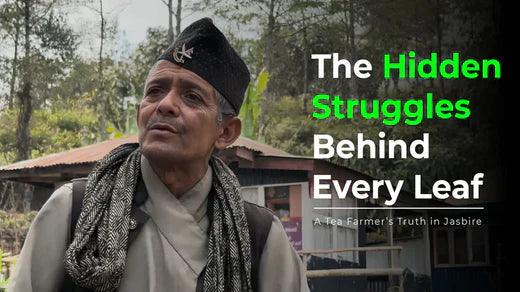
Revealing the Heartbreaking Struggles of Jasbire Tea Farmer
Nepal is famous for its stunning mountains, rich culture, and breathtaking landscapes, but few people know about its incredible tea. In the hills of Ilam, where tea bushes cover the slopes, tea farming is more than just a job—it’s a way of life. For generations, families have depended on these tea gardens, but their hard work often goes unnoticed.
During our visit to Jasbire Tea Processing, we met a farmer who shared the real struggles and sacrifices behind every cup of Nepali tea. His story is not just his own; it reflects the challenges faced by thousands of tea farmers across Nepal.
Tough Terrain, Endless Determination

Farming tea in Ilam is no easy task. The hills are steep and difficult to climb, testing the strength of every farmer. “We carry heavy baskets on our backs, climb the hills, and pick the leaves carefully by hand. Sometimes, the bushes tear our clothes, but we don’t stop. We have no choice,” the farmer explained.
Without modern equipment, farmers rely on traditional woven baskets, called Dokos, to collect and carry tea leaves. The heavy loads and tough terrain make their work even harder, but the farmers push through with incredible resilience.
Poor Roads, Little Support

Transportation is one of the biggest challenges. “The roads here are broken or don’t exist. We can’t get buses to move the leaves or the workers. Many times, we carry the tea ourselves along dangerous paths,” the farmer said.
The lack of proper infrastructure delays their work and affects the quality of the tea. Although the government encourages organic farming, farmers are left to manage the extra costs and effort on their own. “We know organic tea is better for the land and our health, but we need more workers and tools to do it. Who will pay for that?” he asked.
Years of Patience, Unfair Prices

Growing tea takes time and care. “It can take up to 15 years to grow healthy tea bushes,” the farmer shared. “We give so much time and effort, but when it’s time to sell, we don’t get a fair price.”
Most of Nepal’s tea is exported to India, where it’s sold as Darjeeling tea or under other labels. Farmers like him don’t get the credit or the money they deserve. “We sell our tea at low prices because we have no choice. Then others sell it for more, without our name on it. It’s not fair.”
The farmer called for government action to ensure fair pricing. “If we got fair prices, we could hire workers, buy tools, and take care of our families. Right now, many young people leave Nepal for work abroad. If we guided them, they could help grow this industry instead.”
The Value of Organic Tea

Despite the challenges, the farmer spoke proudly about growing tea without pesticides. “I have been healthy for years because we eat organic food and drink our tea. But the youth today eat fast food and forget the benefits of our own traditions,” he said.
Organic farming is better for health and the environment, but farmers need fair compensation to continue these sustainable practices. “If we can value what we have—the land, the tea, and our traditions—we won’t need to leave. This industry has great potential if it’s done right,” he added.
A Cry for Recognition and Fair Pricing
The farmer’s message was clear: “We need fair prices.” Years of patience, hard work, and sacrifice go into every leaf, but farmers struggle to make ends meet. “We are proud of what we grow, but we can’t survive like this. If the government recognizes us and fixes pricing, we can keep our farms alive.”
His story was a mix of frustration and hope. He knows the value of his tea and land. The question is whether others will recognize it too.
Moving Forward

The struggles of tea farmers in Ilam are a reminder of the hidden effort behind every cup of tea. Jasbire Tea Processing is working to create a brighter future by ensuring farmers are valued and their tea is recognized.
At Danfe Tea, we are committed to supporting these farmers by connecting them to fair markets. By choosing Nepalese tea and understanding its story, you can help make a difference.
Every Sip Matters

Behind every cup of tea is a farmer’s hard work, patience, and dreams. Let’s honor their efforts by choosing Nepalese tea and sharing their stories with the world. Because every sip carries their hopes for a better future.
FAQs
1. Why is tea farming so challenging in Nepal?
Tea farming in Nepal is difficult due to steep hills, poor roads, and the lack of modern equipment. Farmers rely on manual labor, which makes the process time-consuming and physically demanding.
2. How does Danfe Tea support tea farmers?
Danfe Tea works to connect Nepali farmers to fair markets, ensuring they receive better prices for their tea and recognition for their hard work.
3. What makes organic Nepali tea special?
Organic Nepali tea is grown without pesticides, making it healthier and better for the environment. The high-altitude farms and traditional methods add unique flavors to the tea.
4. Why don’t Nepali farmers get fair prices for their tea?
Most Nepali tea is exported to India, where it’s sold under different labels like Darjeeling tea. This practice leaves farmers without proper recognition or fair compensation.
5. How can consumers help Nepali tea farmers?
Consumers can support Nepali farmers by purchasing authentic Nepalese tea, sharing their stories, and advocating for fair trade practices.
6. What is the future of Nepali tea?
With better infrastructure, fair pricing, and support for organic farming, the Nepali tea industry has the potential to grow and provide sustainable livelihoods for farmers.










